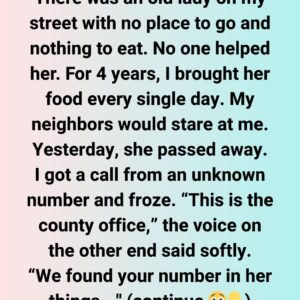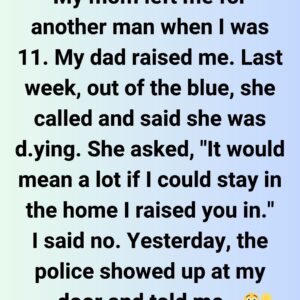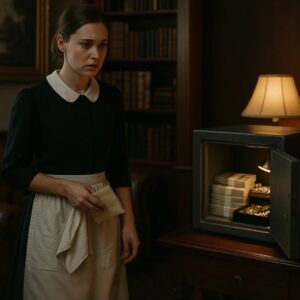It was pouring when I rushed into the small café, pushing my granddaughter’s stroller and clutching my jacket over her to shield her from the downpour. I thought I’d found a moment of refuge, a place to sit, feed her, and wait out the storm. Instead, what happened inside left me humiliated, heartbroken, and questioning how people could treat a struggling grandmother and baby with such cruelty.
My life had changed drastically a year ago. At 40, I gave birth to my daughter, Sarah, who became the light of my life. She grew into a kind, spirited woman, and at 31 she was preparing to be a mother herself. But tragedy struck during childbirth. Sarah never got to hold her baby girl, and I lost not just my daughter, but the person who gave my world meaning.
That left me with baby Amy. Her father decided parenthood was too heavy a responsibility and walked away. Apart from a small monthly check, he is absent. So at 72, I became both mother and grandmother, doing my best with what strength I have left. Amy is all I have now, and I vowed she would never feel abandoned.
The day before the stormy café encounter had been long. Amy’s pediatric appointment had drained both of us—she cried the whole time, and my back ached from carrying her. By the time I stepped into that café, I was exhausted but relieved to be in warmth and shelter.
I settled at a corner table near the window and lifted Amy into my arms to soothe her. She whimpered and fussed, still unsettled after the doctor’s visit. As I reached into my bag to prepare her bottle, I caught the sharp glare of a woman at the next table.
“Ugh, this isn’t a daycare,” she sneered, wrinkling her nose. “Some of us came here to relax, not to listen to that.”
Her companion joined in, his voice cutting like a knife. “Yeah, why don’t you take your crying baby and leave? People pay good money to sit here without listening to this noise.”
My cheeks burned with shame. I tried to keep my composure and whispered, “I just need a place to feed her. I’ll order something once she’s calm.” But the woman rolled her eyes, dismissing me like I was dirt under her shoe. “Feed her in your car,” she snapped. “Don’t bring her here if you can’t control her.”
I struggled to keep my hands steady while fumbling with the bottle. That’s when the waitress appeared. She looked barely older than a student, clutching her tray as though it could shield her. “Maybe it would be better if you stepped outside to finish feeding her,” she murmured. “Some customers are upset.”
My throat tightened. Outside? In the storm? With a crying infant and no shelter? I searched the room for compassion, but most faces avoided me. The world felt cold in more ways than one.
Then something unexpected happened. Amy suddenly stilled in my arms and stretched her tiny hand toward the door. I looked up and saw two police officers entering, rain dripping from their jackets.
The older officer, calm and firm, asked, “Ma’am, we were told you’re causing a disturbance. Is that true?”
“Someone called the police on me?” I stammered, stunned.
The café manager, a mustached man with a sour expression, appeared at the counter and nodded. “She’s refusing to leave. Customers are complaining.”
I pleaded my case, my voice trembling. “I only came in to get her out of the rain. She’s hungry, and I was about to order once she settled.”
The older officer glanced at Amy. “So the ‘disturbance’ is just… a hungry baby?” he asked, raising an eyebrow. His partner, younger and warm-eyed, held out his arms. “May I? My sister has three kids. I’m good with babies.”
Hesitant, I handed Amy over. In seconds she quieted, peacefully drinking from her bottle in his embrace. The officer smiled down at her as if he’d done it a thousand times.
“See? Problem solved,” the older officer said pointedly, turning to the manager. “Now bring us three coffees and three slices of apple pie. We’ll sit with her.”
The café fell silent. The manager flushed red but had no choice. Moments later, the officers and I were sharing coffee and dessert while baby Amy slept contentedly. They introduced themselves as Christopher and Alexander, listened to my story, and reassured me that I’d done nothing wrong. Before leaving, they paid the bill themselves.
Days later, my cousin called me, breathless with excitement. “Maggie, you’re in the paper! The story’s everywhere!”
It turned out Alexander had sent the photo of me and Amy to his sister, a reporter, who published the story of the grandmother and infant forced from a café. The piece went viral, sparking outrage. The café’s owners fired the manager, and when I returned a week later, a new sign hung on the door: “Babies Welcome. No Purchase Necessary.”
Inside, the same young waitress greeted me warmly, almost sheepishly. “Order anything you’d like—it’s on the house.”
This time, instead of humiliation, I felt dignity restored. I ordered pie and ice cream, left her a generous tip, and looked at Amy sleeping peacefully in her stroller.
That day, I was reminded that cruelty may speak the loudest at first, but kindness always finds its way in—sometimes carried by strangers in uniform, sometimes through the simple act of justice walking through the door.





